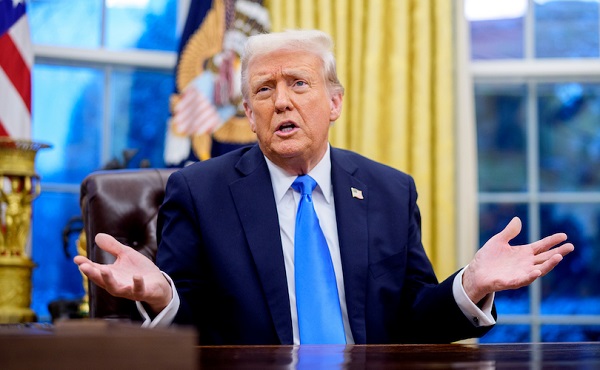From The Center Square
Stocks sunk Thursday afternoon despite President Donald Trump’s decision to grant major exceptions to the 25% tariffs he put on Mexico and Canada earlier this week.
All three major U.S. market indexes were in the red by the time of Trump’s afternoon bill signing. Trump said Thursday in the Oval Office that steel and aluminum tariffs were on track for next week without modifications.
Trump shrugged off the stock losses, blaming the decline on “globalists.”
“I think it’s globalists that see how rich our country is going to be and don’t like it,” he said.
Trump has promised that his tariffs would shift the tax burden away from Americans and onto foreign countries, but tariffs are generally paid by the people who import the products. Those importers then have a choice: They can either absorb the loss or pass it on to consumers through higher prices. He also promised tariffs would make America “rich as hell.” And he’s used tariffs as a negotiating tactic to tighten border security.
Trump granted temporary tariff relief to both Canada and Mexico on Thursday by exempting goods under the United States-Mexico-Canada Agreement from tariffs until April 2.
On April 2, Trump plans to announce broader reciprocal tariffs against countries that impose tariffs on U.S. goods or keep U.S. goods out of their markets through other methods.
Since imposing his latest round of tariffs on top of trading partners this week, Trump has been paring them back. On Wednesday, Trump said the Big Three automakers – Ford Motor Co., General Motors Co. and Stellantis NV – would be exempt from his tariffs for a month.
In February, Trump took a step forward on his plan to put reciprocal tariffs on U.S. trading partners by signing a memo directing staff to come up with solutions in 180 days. Trump previously said he would put those tariffs in place on April 2 to avoid any confusion on April 1.
In his joint address to Congress on Tuesday, Trump said all countries would have to either make their products in the U.S. or be subject to tariffs.
“Whatever they tariff us, we tariff them. Whatever they tax us, we tax them,” Trump said. “If they do non-monetary tariffs to keep us out of their market, then we do non-monetary barriers to keep them out of our market. We will take in trillions of dollars and create jobs like we have never seen before.”
The United States-Mexico-Canada Agreement, or USMCA, governs trade between the U.S. and its northern and southern neighbors. It went into force on July 1, 2020. Trump signed the deal. That agreement continued to allow for duty-free trading between the three countries for products largely made in North America.
U.S. goods and services trade with USMCA totaled an estimated $1.8 trillion in 2022. Exports were $789.7 billion and imports were $974.3 billion. The U.S. goods and services trade deficit with USMCA was $184.6 billion in 2022, according to the Office of the United States Trade Representative.


















